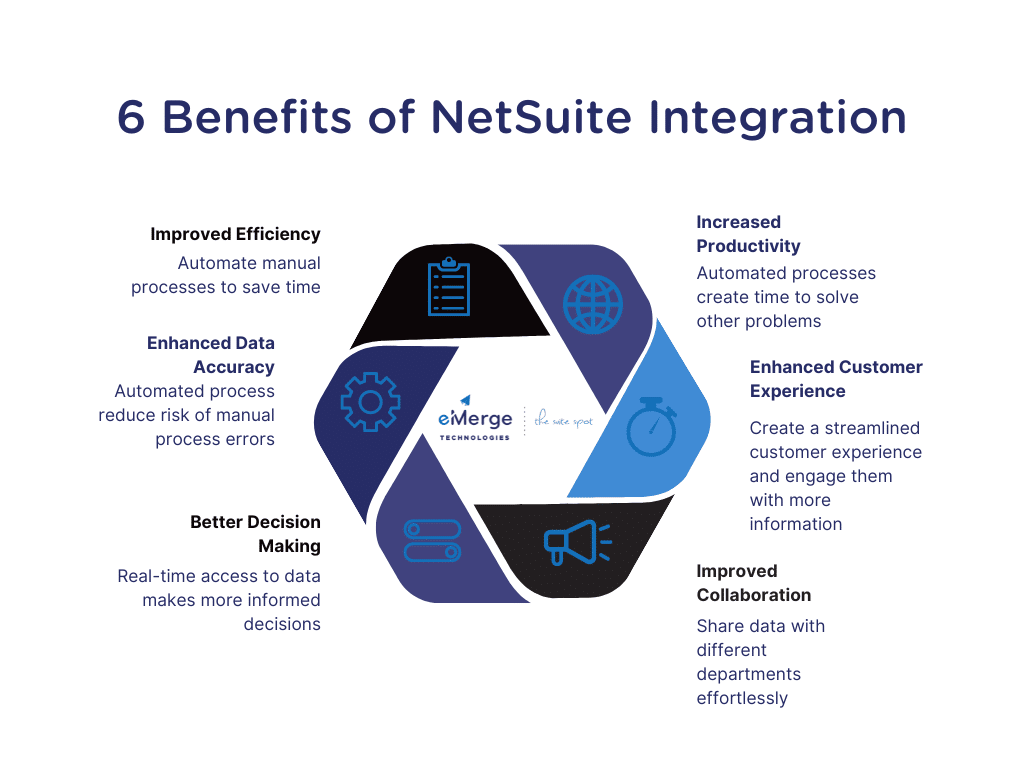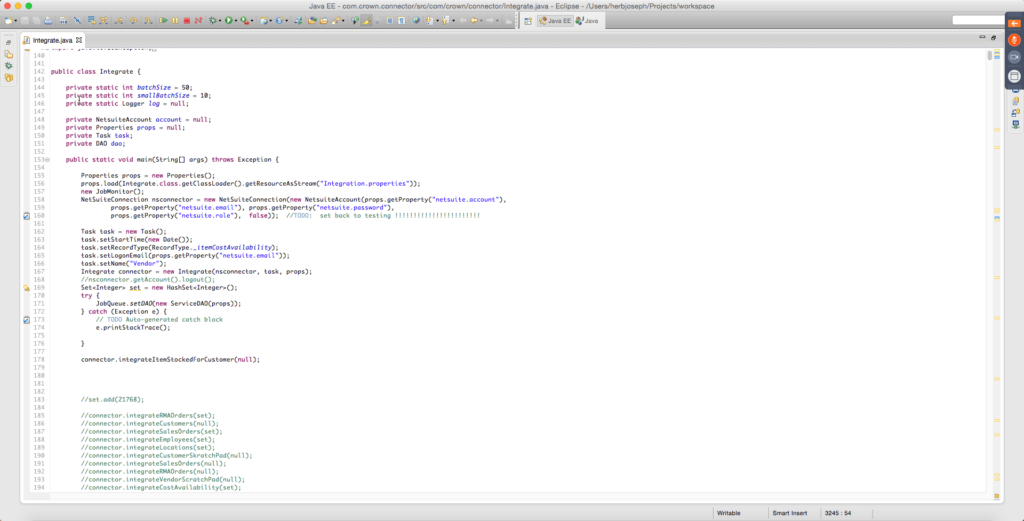- CALL : (+1) 407-273-1001
- Main Office : (+1) 407-273-1001
- NetSuite NetSuite Integration
- Jun 10
- 10 mins read
What is NetSuite Integration? (Your Go-To 2023 Manual)
Integration has become a staple in the modern world of business, and when it comes to NetSuite, this is doubly true. NetSuite’s robust API and reporting tools make it the perfect place to be your business’s “single source of truth”. NetSuite administrators should try to be as knowledgeable as possible about the benefits of NetSuite integration and deploy an integration once a need is spotted.
Depending on your business size, thousands or even millions of dollars are at stake. This risk makes NetSuite integration something you want to get right. That is why we have created this guide to help NetSuite admins get up-t0-speed on the hows, whats, and whys of NetSuite integration.
What is NetSuite Integration?
A NetSuite integration is the connection between the NetSuite ERP system and other software applications, allowing for seamless data synchronization using APIs and other tools.
For example, if your NetSuite ERP was “integrated” with your SalesForce CRM, you can send newly closed sales opportunities to NetSuite and update your books without an admin from sales or accounting ever touching a device. These information flows can be mono-directional or bi-directional, for example, if that same integration application then sent newly updated inventory prices back to SalesForce from NetSuite, that integration would be “bi-directional.”
The flow of information in an integration can be triggered from an event or record change; such as a sales opportunity being won, or triggered at a certain time; such as every week morning at 6 AM create an inventory report with information from your eCommerce platform.
Does NetSuite Have an API?
NetSuite does indeed have an API, which allows developers to access and integrate with its various modules and features. The API provides a set of web services that can be used to create custom integrations, automate business processes, and extend the functionality of NetSuite. With the API, developers can build applications that interact with NetSuite data, customize user interfaces, and perform a wide range of tasks
SuiteTalk Webservices is NetSuite’s API protocol. SuiteTalk is built on the SOAP method of communication. SOAP stands for Simple Object Access Protocol. What this means for users is the NetSuite API is secure and integrations can be built using any development language.
The SuiteTalk Webservices method also supports standard REST functions. REST is another protocol for messaging across the internet and is notable for being more flexible and easier to work with than the SOAP method. By supporting both of these protocols, the NetSuite API becomes robust and flexible, allowing for a wide variety of connections to be made in several ways.
Another thing that makes NetSuite integrations possible is the NetSuite language SuiteScript. SuiteScript is a proprietary development language, based on Javascript, that NetSuite has created to allow the NetSuite platform to be customized by users and third-party developers. SuiteScript is what establishes the business logic that allows SuiteTalk to be used more effectively. SuiteScript will set the events or times that tell the SuiteTalk tool when to ask for data from another application. SuiteScript logic will then also tell NetSuite what to do with that data once it is inside of NetSuite.
Check out our article NetSuite API 101 to learn more about how to take advantage of the NetSuite API.
Meet an Integration ExpertGet Integration Quote
Benefits of NetSuite Integration

There are several reasons your business should consider NetSuite integrations:
- Improved efficiency: Integration allows for the automation of manual processes, resulting in more efficient and accurate data management.
- Enhanced data accuracy: By integrating NetSuite with other systems, you can eliminate the need for manual data entry and reduce the risk of errors.
- Better decision-making: With integrated systems, you can access real-time data from multiple sources, allowing you to make more informed business decisions.
- Increased productivity: Integration can free up time and resources that would otherwise be spent on manual tasks, allowing employees to focus on higher-value work.
- Enhanced customer experience: With integrated systems, you can provide a seamless experience for customers by having access to all relevant customer data in one place.
- Improved collaboration: Integration allows different teams and departments to access and share data in real time, improving collaboration and communication.
What Are Some Common Challenges of NetSuite Integrations?
Like all platforms, NetSuite has its quirks and nuances to integration. We have broken down some of these to help you get an idea of what to watch out for and where there are limitations.
NetSuite concurrency governance
NetSuite only allows a certain number of simultaneous connections per license. If you have a lot of integrations touching NetSuite at or around the same time, they may error out. Compensating for this would require delicate integration architecture or purchasing more licenses if no solution is possible.
Relatively slow data transfer rates
If you are used to the data transfer rates of large-scale databases, NetSuite’s transfer rate may disappoint you. What this means for admins is that processes that are big and require the movement of many records may take much longer than you would expect.
Large and complex API
Understanding NetSuites API and what it is capable of is certainly not done overnight. As we mentioned before, the API allows for SOAP and REST functionality which opens up a lot of options and not all of them are the best or even good. It will take some time or experience to identify the right steps to solve your problem in the best way possible.
NetSuite Integration Options
There are three ways to integrate NetSuite once you realize there is a need. How you go about an integration depends on your level of technical skill, the application you wish to connect to the NetSuite platform, and your budget.
Scratch Code
Creating an integration from scratch requires knowledge of the NetSuite API; particularly its calls and security protocols, familiarity with SuiteScript, knowledge of XML, and familiarity with the target application’s API protocols.
If you have talented NetSuite architects and developers on hand, then this may be the way you want to go. An integration from scratch will not require subscription costs down the road although it will need to be maintained through the years (more on this later). You can check out an example of a hand-written NetSuite integration below.
Find a “Connector”
You may find that a connector is the easiest way to solve your integration need. A connector is a pre-built integration application that is created to connect two popular SaaS applications or solve a common use case.
You can find connectors at the SuiteApp store or by going through popular NetSuite partners. A quick google search will help you find more connectors but you should be aware that not all connectors available have been vetted by NetSuite and these carry more risk to your system.
Finding a connector can make your life much easier, however, they are usually only built for popular apps and use cases as mentioned before, and also come with pesky monthly or yearly SaaS fees.
Purchase an Integration Platform (IPaaS)
An integration platform is a stand-alone SaaS application that is designed to do one thing; building integration applications. Platforms are different from connectors because they can be used to build multiple integrations and are not tied to a single use case or application. You can use them to connect every application in your IT portfolio and in doing so automate most, if not all, processes in your back office. Integration platforms are also capable of EDI, allowing you to automate processes across partners and core B2B customers who are EDI compliant.
Integration platforms are becoming extremely popular among medium to large businesses right now as integration is taking off as a business all its own.
Integration Platforms also reduce your need for technical skills by replacing the need to hard-code with graphical interfaces and wizard-step-by-step processes. Each of these platforms has its learning curve, however. But in time, even complex integrations can be built with competent business analysts.
For more information on this topic, check out our guide on NetSuite Integration Options.
Meet an Integration ExpertGet Integration Quote
How Much Does a NetSuite Integration Cost?
The cost of a NetSuite integration can vary depending on several factors such as the complexity of the integration, the specific features required, and the level of customization needed. Some integrations may be simple, while others may require more extensive development work. In our experience, NetSuite integrations can cost between $200 – $1,100 per month and have a set-up fee ranging from $5,000 – $25,000.
Some Factors that Impact NetSuite Integration Price
Custom Code or Connector? – As discussed earlier, integrations with popular applications have already been built and packaged as SaaS services. These services include development and maintenance for a relatively low monthly fee. However, if the application is custom-built or not as popular in the industry, you may have to have the integration coded from scratch which will have a larger upfront fee and require a custom maintenance plan to monitor and keep up to date.
Real-Time or Batch – Real-time integrations are integrations that are constantly looking out for new data that needs to be transferred between the connected applications. Batch integrations are integrations that are scheduled to collect specific data and then transfer it at scheduled intervals. Real-time integrations cost more as they require a constant connection between the applications and use more processing power to move data.
Number of Endpoints – The number of endpoints is also something that can have a drastic effect on the price of your integrations. An integration that moves data from NetSuite and Salesforce is relatively simple and will have a low fee. However, an integration that takes order information from Shopify and sends it to NetSuite to update inventory and update the GL, and then sends the customer information to SalesForce is a little more complex, thus you can expect it to cost more to license and maintain.
Number of Different Record Types – Less important than endpoints but still a factor is the different types of records being moved between platforms. If you have a NetSuite and Salesforce integration and want to move Account information back and forth that would count as one record type. If you want to also move opportunities, items, contracts, and more, that will require more processing, more maintenance, and more in setup fees.
Top NetSuite Integration Apps for 2023
Celigo
Celigo, founded in 2010, began with a single NetSuite connector and has since added many more and released a dedicated integration platform, Integrator.io. Today, Integrator.io can connect many SaaS applications, with a focus on NetSuite connectors and pre-built functionality.
Mulesoft
Mulesoft is a top player in the integration industry with a complete range of services, documentation, support, and security. It is an enterprise-grade platform with functionality for application integration, EDI and B2B management, workflow development and deployment, and API management.
Jitterbit
Jitterbit is a 15-year-old integration platform with advanced capabilities, including API customization and EDI tools. Its “Harmony” platform is easy for developers and analysts with tech backgrounds to understand and can be used by non-technical analysts after training. Jitterbit is known for its excellent support and prioritization of user concerns.
To learn more about each of these applications and how they compare you can check out our guide, NetSuite Integrations Apps.
Common NetSuite Integrations
NetSuite SalesForce Integration: NetSuite and Salesforce is probably the most common integration we get asked to do. Mostly these two applications are at the top of their fields and businesses using a best a breed approach often pick these two applications. There are many pre-built connectors out there and we love helping clients choose the right one just for them.
NetSuite Hubspot Integration: NetSuite and Hubspot is another very common integration we are asked to configure for our clients. Being able to combine sales and ERP data allows for a enhanced customer experience and provides businesses with a leg up against the competition.
NetSuite Shopify Integration: Connecting NetSuite to a store front is another common use case for NetSuite integration. Connecting the website allows your business to sync sales and inventory data without an employee lifting a finger, among other valuable benenfits.
NetSuite Stripe Integration: Stripe is used be many eCommerce users. Being able to connect payment data and update the G/L in real time is a valuable benefit.
NetSuite Magento Integration: Magento is another storefront that we are often asked to connect NetSuite. Just like with Shopify, connecting your eCommerce platform to NetSuite allows for easy updates to inventory and sales data.
NetSuite Mailchimp Integration: Mailchimp is a fantastic email marketing platform that has some added utility once integrated to your NetSuite ERP. For example, allowing you to run mailchimp campaigns and send emails based off financial or customer related notifications set up inside of NetSuite.
How to Pick a NetSuite Integration Partner
After reading this article, you may find yourself in the market for a consultant or partner to help you set up your own NetSuite integrations. To help new users with this process we have put together a list of factors on which to judge potential partners.
- Determine Your Needs – First, take a step back and try to think about your needs. Things like deadlines, specific app expertise, and complexity. This will help you narrow down a list of partners who can meet them.
- Research Potential Partners – Start to research potential partners. Look at things like the track record, services, communication, and more.
- Evaluate Compatibility – Try to find a partner that will align with your culture. This will make a long-term relationship more likely and fruitful.
- Consider Pricing – Make sure the partner’s prices are competitive and look for value over just finding the cheapest option.
- Review Their Processes – Ask about how they plan, execute, and test solutions and compare them to other partners. Look for thorough, well-thought-out, and time-tested processes.
- Test Their Responsiveness – Contact the partner with some concerns and see how quickly they respond and evaluate the quality of the response.
Check out our article on NetSuite Integration Partners for more information on how to choose one for yourself.
Meet an Integration ExpertGet Integration Quote
NetSuite Integrations FAQ
Which Software Integrates with NetSuite?
There are many software solutions that can integrate with NetSuite such as Salesforce, Shopify, Magento, Zendesk, and many more. NetSuite offers a suite of tools for integration, including a SuiteCloud development platform, REST web services, and pre-built connectors to third-party software applications.
How to Integrate with Oracle NetSuite?
NetSuite provides several options for integration, such as web services, REST APIs, and pre-built connectors. For custom integrations, developers can use the SuiteCloud development platform. NetSuite also offers pre-built connectors to popular software applications, such as Salesforce, Shopify, Magento, and more.
What can you Automate with NetSuite?
NetSuite offers a wide range of automation capabilities, such as automating financial and accounting processes, sales and marketing automation, inventory management automation, and order fulfillment automation. NetSuite shipping integrations allow business to automate fulfillment. Businesses can also create custom workflows and automate various tasks using SuiteFlow, NetSuite’s workflow automation tool.
Does NetSuite use SQL?
NetSuite uses a modified version of SQL called NSQL, which is a declarative SQL language that includes NetSuite-specific syntax for accessing and manipulating NetSuite data. NSQL can be used to create custom reports, searches, and saved searches within NetSuite.
What is the Best Integration for NetSuite?
The best integration for NetSuite depends on the specific business needs and software applications used. NetSuite offers pre-built connectors to popular software applications, such as Salesforce, Shopify, Magento, and more. NetSuite eCommerce integrations are also a common and valuable upgrade for users. Custom integrations can also be developed using NetSuite’s SuiteCloud development platform.
Can you Connect NetSuite to Quickbooks?
Yes, NetSuite can be integrated with QuickBooks using a third-party connector like CloudExtend. This allows for a seamless transfer of data between the two systems, ensuring accurate financial records across both platforms.
Can you Connect NetSuite to Excel?
Yes, NetSuite can be connected to Excel using the NetSuite Excel Add-in. This add-in allows users to access NetSuite data directly from Excel, enabling them to create reports and manipulate data more easily. The add-in can be downloaded from NetSuite’s SuiteApp marketplace.
Final Thoughts
Our hope for this guide was to explain everything a NetSuite administrator needs to know about NetSuite integration as well as provide real-world advice on how to achieve integration success. If you felt that this guide has helped you in some way or you feel that it is missing something please leave a comment below to begin a conversation about it. We appreciate any and all feedback!
Also, if you have any NetSuite integration projects you need help with, you can learn more about our NetSuite Integration services. We have hundreds of NetSuite integration projects under our belt and would be happy to help in any way.
Jeremy McCourt is an content producer in the enterprise software industry that focuses on NetSuite and related cloud-based software solutions.
Related Posts

NetSuite Training 101 (The 2023 Complete Guide)
NetSuite training is an underrated and often overlooked part of the NetSuite ecosystem. In this article, we do what we can to break down why NetSuite training is a critical part of NetSuite users finding…
- Aug 21
- 6 mins read

What is NetSuite Customization? The 2023 Complete Guide
NetSuite, as a leading cloud-based ERP system, has gained immense popularity among businesses worldwide. However, to truly harness its potential, customization is often necessary. In this comprehensive guide, we delve into the world of NetSuite…
- Aug 16
- 6 mins read

